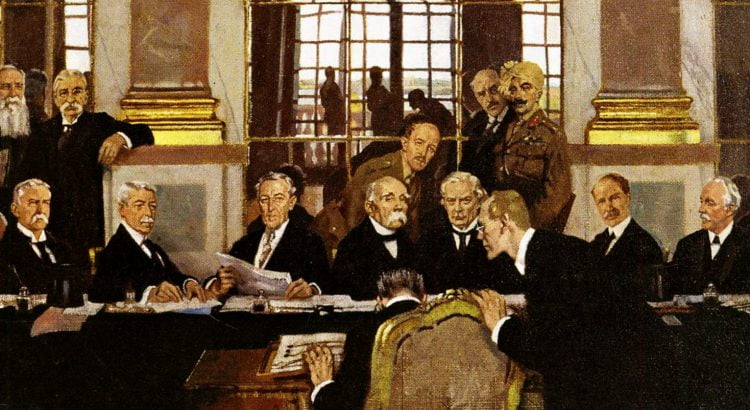The Treaty formally ending the First World War was signed a hundred years ago, on the 28th June 1919. Most school children in the United Kingdom will learn about this event, yet it wasn’t really a long lasting treaty, as much of what it laid out was overturned within 20 years.
So what’s the point?
In fact, whilst we’re at it – what’s the point of History anyway?
Life is moving at such a great rate; the technologies we have in our hands we could hardly have imagined having 20 years ago. Our lives are more effected by the 9/11 attacks in 2001 than anything 100 years ago.
Wrong.
The conduct and ending of the First World War, including the Treaty of Versailles (not to mention the unique period of nationalist revolutions against distant elites) creates resounding echoes for today. In fact, the post war settlements of 1919 shaped many of the pre-conditions for the tensions of the middle east that in due course would lead to the 9/11 attacks.
More than the particular territorial consequences of actions of statesmen 100 years ago, it is the very human frailties which we see played out in in the leaders in Paris in 1919, which we see still at large in our times. Domestic pressure and lack of secure home base of support, resulted in performance of each of the leaders, of France, Britain, Italy and America, being dictated by domestic concerns, at the one time when there needed to be a generous international outlook. Instead, they chose national self-interest and short termism.
They were hampered by popular demands which, as leaders of democracies, they could not easily resist. Yet away from the demands of their democratised populace, they were then surrounded in Paris by Nationalists petitioning for the rights of their new or renewed nations to be given space to arise.
Add to this the dubious character and mercurial traits of the leaders themselves, a good portion of ego, meant then this was a situation doomed from the start.
So, what do we have?
- The rise of populism either towards nationalism or left-wing extremism and sometimes both
- Existing Elites being pushed aside and distrusted
- Dislocation of people due to massive changes in society, work and culture
- Egotistical leaders with a pragmatic eye on their future rather than long term good
- Prevalence of self- interest
It seems, perhaps, we haven’t moved on from the last 100 years so much.
What we have to be careful of, across the democratic world, is powerful public speakers who can promise dynamic change – but who have no obvious plan. Especially if all they ask for is a small erosion of democratic freedom – as the new democracies of 1919 were soon to become oppressive dictatorships.
